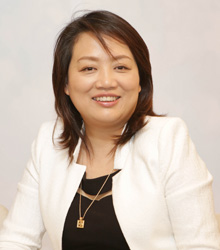| Matriarch of Milk
 |
|
(CFP) |
Sun Yiping, CEO of a leading Chinese dairy producer, has gained media attention for taking proactive actions to rebuild consumer trust amid recent tainted milk scandals.
Sun commanded a fast-track plan to ensure a quality milk supply at China Mengniu Dairy Co. Ltd. in June, when the company announced that it will invest 3.5 billion yuan ($551 million) in eight to 12 new dairies by 2015. At present, 80 percent of its milk is provided by other farms. The move will allow Mengniu to supply its own fresh milk and avoid food safety incidents from outside sources.
Sun also led Mengniu to learn from a foreign peer. The company entered a long-term strategic cooperation on June 18 with European dairy giant Arla Foods, a world leader in dairy farming, pasture management, quality compliance and production processes. The company will be involved in Mengniu's daily operations, send professionals to work with Mengniu employees, help the company update production technology and improve its management system.
Sun, 45, graduated from China Agricultural University with a master's degree in agricultural product processing. She worked for China National Cereals, Oils and Foodstuffs Corp. (COFCO), the country's largest food manufacturer and trader, from 1993 and became deputy general manager of COFCO Property (Group) Co. Ltd. in July 2007. On April 12, 2012, Sun was appointed CEO of Mengniu.
Interest Rate Cuts
The People's Bank of China, the central bank, cut the benchmark interest rate for one-year deposits by 25 basis points on July 6. The benchmark one-year lending rate was also lowered by 31 basis points.
After the cuts, the one-year deposit interest rate fell to 3 percent while that of the one-year loan interest rate dropped to 6 percent.
It was the second time that the central bank cut the benchmark interest rates this year after a 25-basis-point reduction on June 8.
The surprise rate cuts came at a time when many analysts fear the economic growth will slow further in the world's second largest economy in the second quarter.
The central bank also said it allows banks to offer 30 percent discount to borrowers, larger than the previous 20 percent, but the lower limit of the floating band of mortgage loan interests remains unchanged.
The upper limit of the floating band was previously adjusted to 1.1 times the benchmark.
IPO Boom
Funds raised through initial public offerings (IPOs) on China's Shanghai and Shenzhen stock exchanges is expected to reach 200 billion to 250 billion yuan ($31.4 billion-$39.3 billion) this year, said accounting firm PricewaterhouseCoopers (PwC) on July 3.
During the first half of this year, China's IPO market experienced a slump as uncertain global economic prospects and the euro-zone debt crisis dented investor confidence.
A total of 77.5 billion yuan ($12.2 billion) was raised through 105 IPOs during the January-June period, down 56 percent and 38 percent, respectively, from a year earlier, the report stated.
The ratio was still higher than the average international level, said Sun Jin, a partner at PwC China.
But a report by accounting firm Ernst & Young said only one Chinese company—online discount retailer Vipshop—held a successful initial public offering (IPO) in the United States during the first half of this year, down from 13 in the same period last year.
Nineteen Chinese companies were delisted from stock exchanges in the United States during the first half, according to the report.
Ivan Tong, assurance partner with Ernst &Young, said more Chinese companies are seeking delisting partly because the stock prices are lower than expected, therefore "they would rather wait for better chances and better markets."
PMI Hits New Low
The purchasing managers index (PMI), a key gauge of manufacturing activities, fell to a seven-month low of 50.2 in June, compounding concerns over the future of the world's second largest economy.
"The falling index suggests that the economy still faces downward pressure," said Cai Jin, Vice Chairman of China Federation of Logistics and Purchasing, which releases the index.
But "the extent of the decrease this year is the smallest in years, which means that the economy is building a foundation for stable growth," said Cai.
There are still many factors hitting production and it will take some time for manufacturing to turn the corner, said Zhang Liqun, a researcher with the Research and Development Center of the State Council.
Boosting Private ODI
China on July 3 pledged to help private companies invest abroad while guiding and regulating their investment activities.
The country will strengthen macro guidance on private companies' outbound direct investment (ODI) and help them invest in a step-by-step and focused manner, according to a statement jointly issued by 13 Central Government departments, including the Ministry of Commerce and the People's Bank of China.
The nation will increase financial support to private companies and simplify customs clearance procedures, the statement said.
These companies are also encouraged to strengthen coordination and cooperation among each other to prevent disorderly and malignant competition.
Korean Investment
Bank of Korea (BOK), South Korea's central bank, said on July 1 that it invested $300 million into China's A-shares last month in a bid to diversify its foreign reserves.
In June, the BOK's $300-million quota under the qualified foreign institutional investor (QFII) program was all invested into the Chinese A-share equity market, according to the central bank.
The BOK selected various asset managers, including local ones, to trust the funds for the QFII as the indirect investment can boost competition for higher investment returns among asset managers, secure diverse investment strategy and enhance risk management. | 